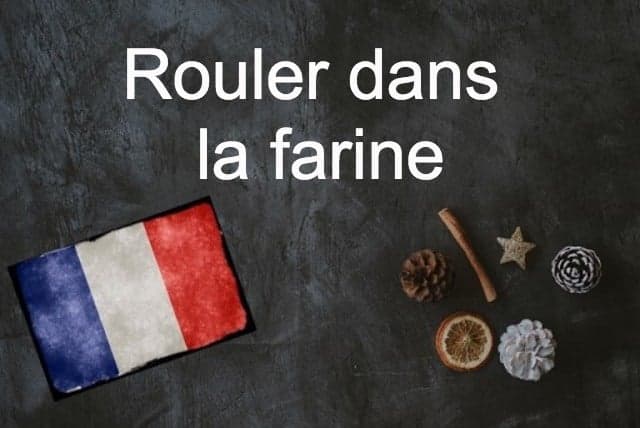French phrase of the day: Rouler dans la farine

France loves a good food metaphor, and this is definitely one of the strangest.
Why do I need to know rouler dans la farine?
Because it would help you avoid some (funny) misunderstandings.
What does it mean?
Rouler dans la farine translates as 'roll in flour', which sounds like a fun activity you would do at the boulangerie.
But you don't have to be a baker to roll stuff in flour in France, at least not when using this expression, which is in reality a metaphor for something quite different.
In reality, rouler dans la farine means 'fool' or 'deceive'. The closest French synonym is duper, 'to fool'.
As you have probably guessed, the flour is a form for disguise, the idea being that the white powder conceals the truth to the person that is rolled in it.
Origins
This expression originated in the early 19th Century when rouler (roll) meant 'deceive'. Je me suis fait rouler - I made myself roll - therefore meant 'I was fooled'.
The flour was a symbol of "beautiful speech", according to French online dictionary l'Internaute.
Another theory claims the flour referred to that white powder actors back then used to cover their faces.
You are either being rolled in flour (being fooled) or you roll someone else in flour (fooling them).
When talking about yourself, you say je me fais rouler dans la farine (I'm being fooled), or je me suis fait rouler dans la farine (I was fooled).
If you are a bit unsteady grammar-wise, it is easier to be the fooler, not the fooled, when conjugating this expression:
Je te roule dans la farine (I am fooling you) - Je t'ai roulé dans la farine (I fooled you).
Use it like this
On s'est bien fait rouler dans la farine, dis-donc. - We were thoroughly fooled, hey.
Je ne te laisserai pas me rouler dans la farine cette fois ! - I won't let you fool me this time!
Ils les ont roulés dans la farine si longtemps que personne ne sait plus ce qui est vrai et ce qui est faux. - They have deceived them for so long that no one knows what is true and what is false anymore.
Synonyms
Duper - fool
Tromper - deceive
Berner - delude
Comments (1)
See Also
Why do I need to know rouler dans la farine?
Because it would help you avoid some (funny) misunderstandings.
What does it mean?
Rouler dans la farine translates as 'roll in flour', which sounds like a fun activity you would do at the boulangerie.
But you don't have to be a baker to roll stuff in flour in France, at least not when using this expression, which is in reality a metaphor for something quite different.
In reality, rouler dans la farine means 'fool' or 'deceive'. The closest French synonym is duper, 'to fool'.
As you have probably guessed, the flour is a form for disguise, the idea being that the white powder conceals the truth to the person that is rolled in it.
Origins
This expression originated in the early 19th Century when rouler (roll) meant 'deceive'. Je me suis fait rouler - I made myself roll - therefore meant 'I was fooled'.
The flour was a symbol of "beautiful speech", according to French online dictionary l'Internaute.
Another theory claims the flour referred to that white powder actors back then used to cover their faces.
You are either being rolled in flour (being fooled) or you roll someone else in flour (fooling them).
When talking about yourself, you say je me fais rouler dans la farine (I'm being fooled), or je me suis fait rouler dans la farine (I was fooled).
If you are a bit unsteady grammar-wise, it is easier to be the fooler, not the fooled, when conjugating this expression:
Je te roule dans la farine (I am fooling you) - Je t'ai roulé dans la farine (I fooled you).
Use it like this
On s'est bien fait rouler dans la farine, dis-donc. - We were thoroughly fooled, hey.
Je ne te laisserai pas me rouler dans la farine cette fois ! - I won't let you fool me this time!
Ils les ont roulés dans la farine si longtemps que personne ne sait plus ce qui est vrai et ce qui est faux. - They have deceived them for so long that no one knows what is true and what is false anymore.
Synonyms
Duper - fool
Tromper - deceive
Berner - delude
Join the conversation in our comments section below. Share your own views and experience and if you have a question or suggestion for our journalists then email us at [email protected].
Please keep comments civil, constructive and on topic – and make sure to read our terms of use before getting involved.
Please log in here to leave a comment.